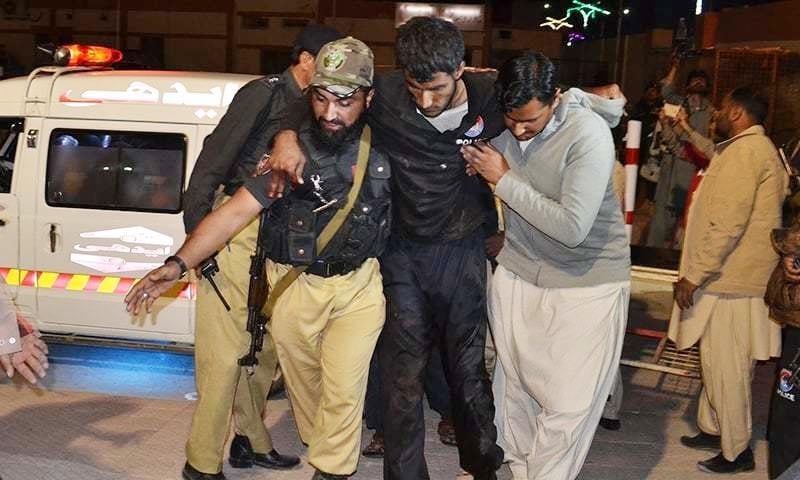

The recent tragedy in Quetta and our response to it, from citizens and state, is instructive. The narrative in Pakistan about terrorism and our response to it is nothing less than schizophrenic. Regardless of whether the apex court of the country deems it a mental illness or not, the state of Pakistan cannot be acquitted -- since it chooses to be schizophrenic.
On the one hand, we are (so we are told) a country with impregnable defence. We can take on the mightiest economies and militaries. Yet we have enemies who somehow continue to make us bleed and we have little to no knowledge or strategy for countering this. A country and a military that boasts of nuclear weapons, provides security for economic corridors and yet fails to check attack after attack on its vulnerable citizens is still weak.
It is time we admit that there is something grotesquely shallow about our willingness to peg tens of thousands of deaths as ‘sacrifices’. The innocent cadets who died recently or the tens of thousands who died before were not looking for martyrdom -- they were ordinary people going about their daily lives. The only sacrifice they made was the decision to not abandon everything when the state failed to protect those who died before them.
Terrorist attacks in Balochistan have another angle: one that the state does not often want us to see. And this is where schizophrenia is relevant again. For decades, Balochistan has suffered -- because of the oppressive policies of the Federation as well as the security establishment’s misgivings about the province. Screams of relatives of those who have disappeared or been killed in fake encounters in that province do not matter to us. That province and its cities are mostly invisible to Pakistanis.
It only matters when we talk about resources. Now these are resources that the Federation and its larger provinces want to continue devouring. Therefore, Balochistan matters only because it keeps feeding the Federation’s desires. To the extent that Balochistan speaks of provincial autonomy, it is looked at with enormous suspicion.
Of course terrorism and use of violence by Baloch separatists has its own problems and should be condemned. But citizens of Pakistan in other provinces (particularly Punjab) do not really want to know or ask about human rights violations committed by the state in that province. There is enough literature and non-violent articulation of grievances to show anyone (who wants to look) how serious the problem is.
A terrorist attack in Balochistan generates various reactions: the state’s knee-jerk reaction is to blame it on the foreign hand. That may partially be true in some instances. But over time it has become more difficult to blame it on other states because the fanatics we trained are now making sure everyone knows whom they attacked and why. But the marginalised will continue to suffer. Hazaras remain vulnerable.
When lawyers died by the dozens, cries went up of a united Pakistan. But the Baloch are not idiots. They see violence from the state as well as non-state actors as the preferred mode of sending a message across. We cannot expect Balochistan to suddenly eye the Federation with gratitude when it selectively condemns violence in the province -- while using it as a tool of policy itself.
Furthermore, promising a population roads and bridges while littering the side-alleys with dead bodies of their loved ones is no one’s idea of prosperity. I have written before about the tragedy of a state too weak to protect its vulnerable yet strong enough to oppress its citizens.
Violence by non-state actors in Balochistan is somehow treated as more grave because it points to a deeper conspiracy against the state. Yet the state’s own solution to Balochistan has often been ignoring violence carried out in its name. Why is it that a terrorist attack in Lahore is used as a rallying cry to unite against extremism but in attack in Quetta somehow means that everyone must tow the Punjabi-dominated nationalist line?
For attacks in Balochistan, the problem we are told is not within but outside. And ‘they’ allegedly are feeding elements here. Hence the vicious cycle of suspicion continues.
The media of course feeds this schizophrenia -- and it also tries to drown out voices that condemn the state’s appropriation of deaths in a violence-ridden province. We cannot appropriate deaths or violence in a disenchanted province to further our own Punjabi-centric version of nationalism. There is no greater disservice to the deaths of innocents than to use the dead to further faulty stances.
At one level, we all condemn violence. At another, we look away when violence is committed in our name. In one breath, we call for a united Pakistan, in the next we gag voices that want rights we take for granted.
Every time terrorists attack Balochistan, we should mourn not just for the latest loss of life, but how we decided to appropriate the dead in life and death. We should mourn our own schizophrenic positions, our wilful blindness to the violent discourse and policies that affect that province daily. The tragedy is that while the disenfranchised are alive, we do not let them speak. And when innocents die, we appropriate the right to speak for them. The living, the dead -- they remain invisible.